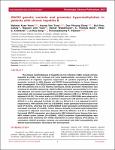SOCS3 genetic variants and promoter hypermethylation in patients with chronic hepatitis B
Hoan, Nghiem Xuan
Tong, Hoang Van
Giang, Dao Phuong
Cuong, Bui Khac
Toan, Nguyen Linh
Wedemeyer, Heiner
Bock, C. Thomas
Kremsner, Peter G.
Song, Le Huu
Velavan, Thirumalaisamy P.
The clinical manifestations of hepatitis B viral infection (HBV) include chronic hepatitis B (CHB), liver cirrhosis (LC) and hepatocellular carcinoma (HCC). The contribution of negative regulator suppressor of cytokine signaling-3 (SOCS3) promoter variants in HBV disease and SOCS3 hypermethylation in tumor tissues were investigated. The SOCS3 promoter region was screened for polymorphisms in 878 HBV patients and in 272 healthy individuals. SOCS3 promoter methylation was examined by bisulfite sequencing. SOCS3 mRNA expression was quantified in 37 tumor and adjacent non-tumor liver tissue specimens. The minor allele rs12953258A was associated with increased susceptibility to HBV infection (OR=1.3, 95%CI=1.1-1.6, adjusted P=0.03). The minor allele rs111033850C and rs12953258A were observed in increased frequencies in HCC and LC patients compared to CHB patients (HCC: OR=1.7, 95%CI=1.1-2.9, adjusted P=0.046; LC: OR=1.4, 95%CI=1.1-1.9, adjusted P=0.017, respectively). HBV patients with rs111033850CC major genotype had decreased viral load (P=0.034), whereas the rs12953258AA major genotype contributed towards increased viral load (P=0.029). Tumor tissues revealed increased hypermethylation compared to adjacent non-tumor tissues (OR=5.4; 95%CI= 1.9-17.1; P=0.001). Increased SOCS3 expression was observed in HBV infested tumor tissues than non-HBV related tumor tissues (P=0.0048). SOCS3 promoter hypermethylation was associated with relatively low mRNA expression in tumor tissues (P=0.0023). In conclusion, SOCS3 promoter variants are associated with HBV susceptibility and SOCS3 hypermethylation stimulates HCC development.
No license information

